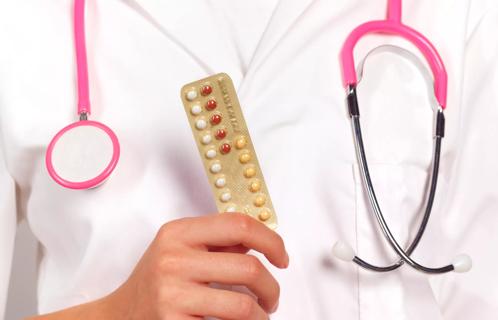If you’re considering stopping yours, here’s what to know

Maybe you’re ready to try to get pregnant, or maybe you want to switch to another kind of birth control. Whatever the reason, you’re ready to stop using your current form of birth control — and you want to do it safely.
Advertisement
Cleveland Clinic is a non-profit academic medical center. Advertising on our site helps support our mission. We do not endorse non-Cleveland Clinic products or services. Policy
Ob/Gyn Ashley Brant, DO, talks about how to go off of your birth control and what to expect afterward.
Before you stop using your birth control, think through your reasoning, which will help determine when to stop using it.
In most instances, fertility returns very quickly after stopping birth control — within a few days of starting your period. That means you could become pregnant soon after stopping your birth control, so make sure you’re ready.
“The most common misconception is that you need to go off birth control months in advance of trying to get pregnant, and that’s just not true,” Dr. Brant says. “The last thing you want to do is stop using your birth control before you’re ready to get pregnant but then end up getting pregnant right away.”
Tired of taking the pill every day and want to try something else? No matter the form of birth control, you’re currently using, it’s safe to transition to a different method without taking a break between them. “You can go right from one method to another,” Dr. Brant says.
That means you don’t need to go through a birth control-free interval in order to make the switch — and you could become pregnant if you choose to do so.
Although it’s safe to quit your birth control mid-cycle, Dr. Brant suggests finishing out your current round so long as your side effects are not significantly impacting your quality of life.
Advertisement
“I generally encourage people to stay on it until they get in to a doctor to talk about other methods,” Dr. Brant says. Your healthcare provider can troubleshoot side effects and help you identify a better form of birth control for your body’s needs.
Once you’ve identified your reasons for stopping birth control, the way you go about stopping it will be dependent on the form of birth control you use. Here’s how to safely stop using birth control and what’s likely to happen when you do.
If you’re using oral contraceptives (“the pill”), a birth control patch or a vaginal ring, you can actually stop cold turkey.
“If you’re on a form of birth control that you control yourself, there’s no harm in stopping whenever you want to stop,” Dr. Brant says.
Still, she suggests finishing out your current cycle, rather than stopping in the middle of it, because you can usually expect to have your period within a few days of stopping.
“In order to not screw up your period, just finish your current round of birth control and then switch to your new form of birth control or stop using it entirely,” she says. If you need to stop it sooner — for example, in case of negative side effects — try to consult with your healthcare provider first, just to be safe.
If you have a hormonal implant or an intrauterine device, you’ll have to make an appointment with your healthcare provider to get it taken out.
Tempted to try to remove your IUD on your own? Although one study found that 1 in 5 women is able to successfully take out her own IUD, Dr. Brant doesn’t recommend it.
“It’s unlikely to be seriously harmful, but the main risk is that you pull on the IUD string and it dislodges but doesn’t come out, which can be crampy and painful,” Dr. Brant says. “Now you need to have a healthcare provider to remove it, and you’ve turned a non-urgent issue into something much more time-sensitive.”
It’s hard to tell say how soon your period will return after having an IUD or hormonal implant removed. It depends on whether you used a hormonal or non-hormonal IUD, where you are in your current menstrual cycle, how long it takes the hormones to leave your body, etc.
“Expect your period to come any time between the day you have it removed and four weeks from then,” Dr. Brant says. Your healthcare provider may be able to give you a more accurate estimate based on exactly what kind of birth control you’ve been using and whether you had regular cycles before starting birth control.
Advertisement
Regardless, you can probably expect some light spotting and cramping in the meantime.
Pregnancy prevention shots like Depo-Provera® essentially provide your body with a hefty dose of birth control intended to stay in your system for three months — which makes going off this type of birth control a bit more nebulous than the rest.
To go off of this form of birth control, just don’t get your next shot. But be aware that your periods and fertility may take more than the initial three months to return.
“In some people, it takes more than three months for the hormones to wear off,” Dr. Brant says, “and it could take even longer for your period to come back.”
Your body may experience some changes when you go off of your birth control — but they’re not exactly side effects.
“Some birth control methods have non-contraceptive benefits, including lighter, shorter periods, clearer skin, and less hair growth on the face,” Dr. Brant says. “All those things may come back when you go off of birth control because your body is going back to its baseline.”
If you want to go off or switch your birth control method but have questions about how to do it or concerns about what to expect, touch base with your healthcare provider to talk it out.
Advertisement
Advertisement

Sign up for our Health Essentials emails for expert guidance on nutrition, fitness, sleep, skin care and more.
Learn more about our editorial process.
Advertisement

The Yuzpe regimen is less effective than other forms of emergency contraceptives, and it’s associated with more side effects

Both are about equally effective when used properly — IUDs are long-lasting and don’t require you to think about them

Birth control medications are more than 99% effective, but only when used properly

Today’s birth control pills don’t usually cause depression — but hormones affect everyone differently

No, you can’t prevent pregnancy by douching after sex, having sex standing up or having sex only at the ‘safe’ time

IUDs can make your period lighter, heavier, irregular or stop it completely

Birth control gel is simple to use and an effective method for preventing pregnancy

The scenarios vary based on how many pills you’ve missed and whether you take a combination pill or progestin-only pill

Even small moments of time outdoors can help reduce stress, boost mood and restore a sense of calm

A correct prescription helps your eyes see clearly — but as natural changes occur, you may need stronger or different eyeglasses

Both are medical emergencies, but they are very distinct events with different causes